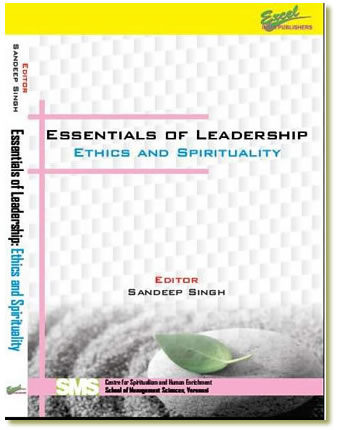 |
||
|
 |
|||||||||||||||||||||||||||||||||||||
|
Mahatama Gandhi had once said that the purpose of development is to make things simpler. But what we observe in present world is that despite of the so called developments in science and technology things have become more complex at least from the point of view of harmony, humanity, trust, love, and human relationships. Today, the society is probably more fragmented and divided than it ever was in the history of mankind. Mutual trust and harmony has almost vanished and people have started seeking business even in human relationships. Last few decades have belonged to dominance of business. No other field, profession, or activity comes even closer to business when it comes to dominating the present world scene. And when we peep into the business world we find that money stands ahead of humanity. This makes the scene disturbing. The epidemic of corporate scams, frauds, and scandals is spreading unabated. The society, every now and then, witness unethical activities committed by large business organizations doing lot of damage to common people, investors, employees, and environment. The relevant questions that comes to mind are that why things are becoming complex, why there is crisis of humanity in world society, why so many large business corporations are getting themselves involved in unethical practices, why common man is losing hope, why everybody wants to dominate others, and what can be the solution for the evils that is prevailing in the world society. For the answers, if we look closely at the happenings of last few decades, we get compelled to focus on leadership.
In all probability it is leadership that has failed and the biggest crisis that this world is facing today is that of leadership crisis. The leaders, whether business or political, have failed to provide a better world. The corporate scandals that we have seen are basically the result of misdeeds of leaders who were at the helm of affairs. When we look at political leaders of today we find that there is hardly any leader who has a genuine agenda for making this world a better place to live in. These leaders are limited to selfish agenda seeking personal benefits, or some other minor agenda limited to a nation, group of nation, or a small community. Western leader’s talk extensively of globalization but their mindsets are still limited to economic globalization because that is in their benefit. We don’t find a humanitarian global mindset of leaders in present times and that is the reason that this world despite of so many material developments is facing the crises of ethics, values, and humanity. Business leaders of modern times have no doubt demonstrated great
abilities when it comes to skills, framing of organizational systems
and structures, and developing business strategies. But when it
comes to ethics and values, most people will agree that in this
aspect modern world business leaders have failed miserably. The
root cause of leadership failure in recent times is that ethics,
values, and humanity were subsided for materialistic objectives.
This book seeks to contribute to a vision for leadership based on spirituality and ethics. The objective is not to create another ‘Utopia’, to illustrate a new theory of perfection. Instead an essential application of spirituality and ethics is emphasized for leadership in business where success is normally determined by margins of profit and where ethics is largely confined to the periphery or beyond. The point is that the coalescence of virtue and profit is possible only when daring, creative and insightful business leadership is practiced in society. Such leadership should take cognizance of the psychological, social and spiritual values, and associated needs, of not only the leader but of others also, thereby placing business at the service of society as a whole. It is indisputable that spiritual and ethical leadership plays an important role in the creation of a business environment in which spirituality and ethics are brought into relationship for the good of all. In this regard, character and, in particular, the character of leaders is paramount. When it comes to ethics and spirituality we find that ancient literature has lot of relevance. In this book pertinent aspects related to spirituality and ethics for leadership have been covered extensively. For the harmonious co-existence of materialism and spiritualism in a leader there is an ancient Indian concept of Rajarshi. This concept is explained in detail in this book. Lessons for leadership based on spirituality and ethics are also derived in this book from Bhagavad Gita, Astanga Yoga, Sri Ramcharitmanas, Kautilya, Gautam Buddha, and Lord Krishna. The teachings of Swami Vivekananda and Sri Aurobindo who achieved sainthood in modern times are also covered from the leadership perspective. The concept of a philosopher king of Plato has also been explained in the book. The other relevant aspects such as responsible leadership, improving the work cultures of business organizations through spiritual leadership, Role of Dharma for ethical behaviour of leaders, Sacrificing dimensions in organizational leadership, role of leaders in business ethics, how to manage stress in leadership through spirituality, and spiritual lessons for business leadership are also covered in this book. One of the most exemplary ethical leaders of modern times has been Jamsetji Nusserwanji Tata. His ethical leadership has been discussed in detail in this book. The reasons for ethical failures of successful leaders have also been explained. In nutshell it could be said that this book is a small but unique effort to highlight and bring to the fore front the spiritual and ethical dimensions which are the essential elements for any type of leadership. The missing elements of modern leadership are being presented in this book as a paradigm for overcoming the shortcomings of leadership in present times. The root cause of the damage that has taken place and the expected damage that could take place in the future lies in the neglection of spirituality and ethics in the leaders. This book is a sincere effort to make the modern leaders realize this fact and to provide them an insight that if followed could make them a better leader in the future. Mr. Sandeep Singh
|
|||
| HOME
| VISION
| OUR PROGRAMMES
| ACTIVITIES
| PUBLICATION
| PRESS COVERAGE
| NEWS &
ANNOUNCEMENT | VEDIO CLIPS
| CONTACT US © Copyright, School of Management Sciences, Varanasi |

